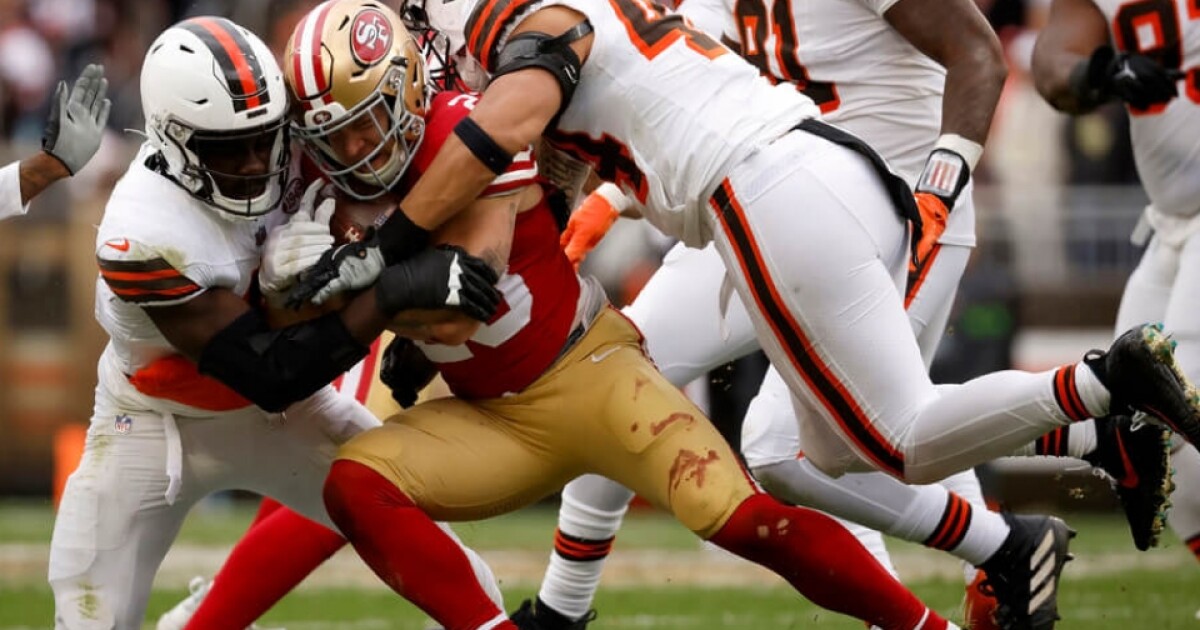The San Francisco 49ers will take on the Minnesota Vikings for Monday Night Football. But while fans cheer on their team from home or the stadium, artificial intelligence will be behind the scenes analyzing millions of data points on every play.
It’s all part of a new program called the Digital Athlete that the NFL has rolled out to help better understand injuries and make the game safer for players.
We refer to a football field as the gridiron. It’s a checkerboard of hash marks where teams battle as they throw themselves at one another in celebration of a violent sport.
But while players are on the field exerting themselves, Ben Peterson sits comfortably in a chair, crunching numbers collected from that battlefield.
“I probably start my day with a couple of graphs and end my day with a couple of graphs,” he said. “And as long as everything goes well, I don’t have to do any graphing in the middle of the day.”
SEE MORE: NFL quarterbacks get redesigned helmets to lessen concussions
Peterson is the vice president of health and performance for the San Francisco 49ers. His job is exactly what it sounds like: Keep players healthy and available. That means he spends the better part of his days staring at screens as he interprets data and uses those conclusions to guide training and rehab.
“Most people would think if you interact with a lot of data, it kind of isolates you,” Peterson said. “I think it’s the opposite because it gives you a lot of things to talk about.”
This year, one of the things he can’t stop talking about is his new assistant, the Digital Athlete.
“What’s really helped with that is you get off of trying to do the analysis and you can spend way more time with the player,” Peterson said. “Or you can spend way more time talking to other people on the staff, right? You can spend more time communicating with the coaching staff.”
The Digital Athlete is a three-dimensional rendering of a player that the NFL created with Amazon Web Services. It takes any play, runs it at every angle and in any condition, millions of times, allowing people like Peterson to see the results so they can better guide player safety in practice and on game day.
SEE MORE: Study: Head impacts, not concussions, drive football-related CTE risk
The technology began development in 2019. Last year, the NFL piloted its use with four teams during the season, and this year is the first time it’s been available for the entire league to use.
“When you think about it, a healthy roster is a healthy team. And in the longevity of a season, you need a healthy roster,” said Jennifer Langton, vice president of health and safety innovation for the NFL.
She says much of the innovation we’ve seen over the last few years — whether it be not allowing players to initiate hits with their helmets, trip, or launch at another player — have been made, in large part, because of the data gathered by the Digital Athlete.
“There is a potential to revolutionize not just health and safety in the NFL, but also to address injury prevention and detection,” Langton added.
The information also seems to be helping. According to the NFL, concussions are down 25% since 2018, and Peterson says the 49ers have also seen fewer soft tissue injuries this year than they did at this point last season.
“I definitely think it’s good for the game,” he said. “I’m always biased. I think more information is good. You just have to understand how to use it and action it.”
Trending stories at Scrippsnews.com
